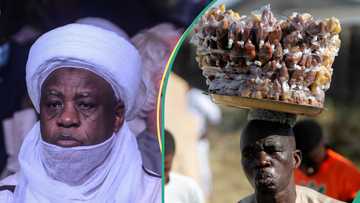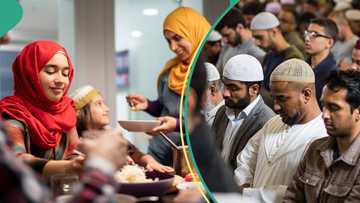Ramadan 2025 timetable and Ramadan rules in Nigeria: What and when to do
Ramadan is the ninth month of the Islamic calendar, observed by Muslims worldwide as a period of fasting, prayer, reflection, and community. In 2025, Ramadan began in Nigeria on Saturday, March 1, following the sighting of the new moon on February 28. This article compiles the 2025 Ramadan timetable and rules in Nigeria.

Source: UGC
TABLE OF CONTENTS
- Key takeaways
- Ramadan 2025 timetable and Ramadan rules in Nigeria
- The five pillars of Islam
- Why is Ramadan celebrated? The history of Ramadan
- Nigerian Ramadan food timetable
- Ramadan 2025 fasting schedule
- What are the expected dates for Eid in 2025?
Key takeaways
- Ramadan 2025 began on Saturday, March 1, following the sighting of the new moon on February 28.
- Before dawn, Muslims consume a meal known as Suhoor to prepare for the day's fast.
- From dawn until sunset, Muslims abstain from food, drink, smoking, and sexual relations.
- At sunset, the fast is broken with a meal called Iftar.
Ramadan 2025 timetable and Ramadan rules in Nigeria
Ramadan is the holiest month in Islam, observed by millions of Muslims in Nigeria and around the world. It is a period of fasting, prayer, reflection, and community, lasting for 29 or 30 days, depending on the sighting of the moon.
During this time, Muslims fast from dawn (Fajr) until sunset (Maghrib), refraining from food, drink, and other physical needs as an act of worship and spiritual discipline.
The Ramadan 2025 timetable and rules in Nigeria will help you understand the schedule during the holy month for spiritual growth and communal unity.
What are the Ramadan dates for 2025?
In Nigeria, Ramadan in 2025 began on Saturday, March 1, following the sighting of the new crescent moon on Friday, February 28. The fasting period will continue for 29 or 30 days, depending on the lunar observation, concluding with the celebration of Eid al-Fitr.
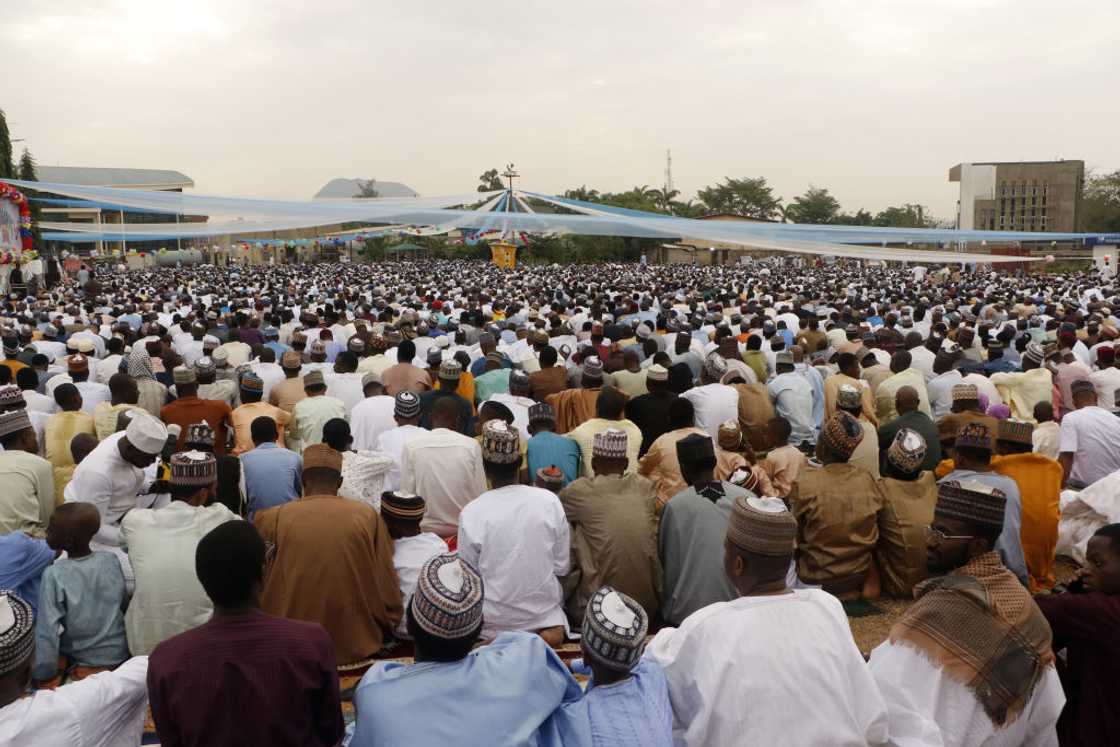
Source: Getty Images
How do you know when Ramadan ends?
This holy month lasts 29 or 30 days, depending on when the crescent moon is sighted.
The five pillars of Islam
Islam is centred around five essential pillars that guide the believers.
- Shahada meaning faith
- Salat refers to praying five times each day while facing Mecca.
- Zakat is centred around helping the poor.
- Sawm meaning fasting
- Hajj means making a pilgrimage to Mecca at least once in every Muslim's lifetime.
Why is Ramadan celebrated? The history of Ramadan
The Holy Book was first revealed to Prophet Muhammad during the powerful night (Laylat al-Qadr), and Ramadan celebrates this revelation.
This obligatory month of sawm shows one's fear of God and oneness with Him. It is also a month of repentance, generosity, love, and perseverance. Ramadan was first observed in 624 CE during the second year of the Hijra.
Ramadan meaning
In Islam, Ramadan is the month of sawm. It is the ninth month of the Muslim year, and every adult Muslim is expected to refrain from drinking, eating, smoking, and having sex between dawn and sunset.
One is only permitted to break the fast after the sounding of the adhan (the muezzin's call to worship).
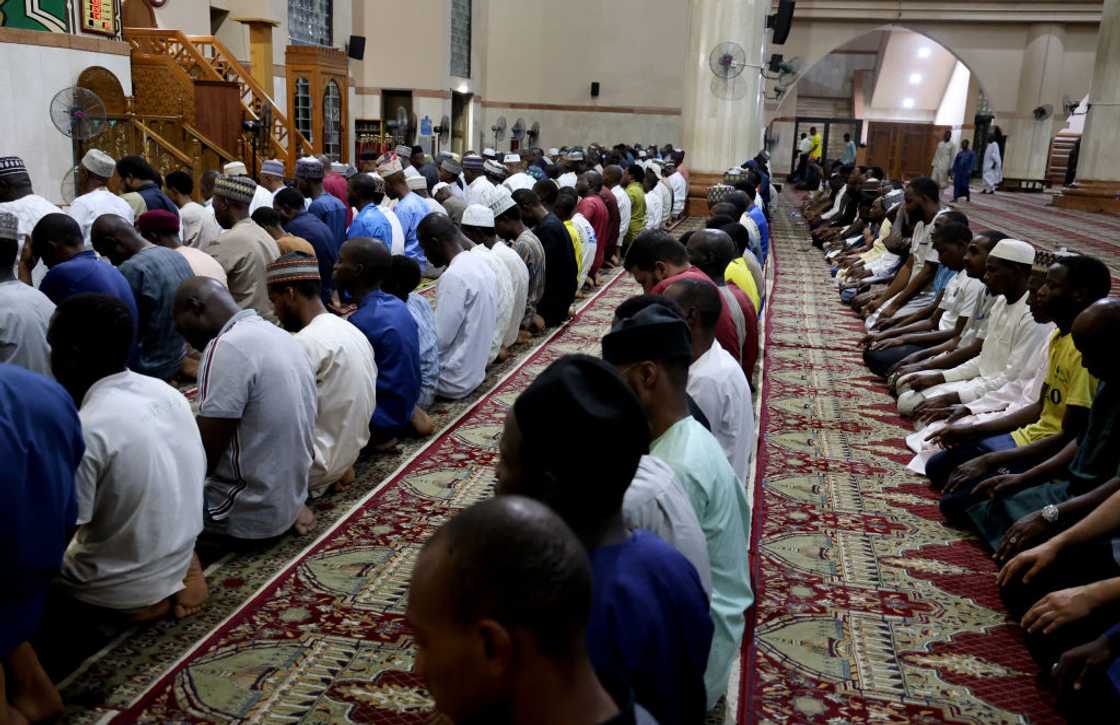
Source: Getty Images
Ramadan prayers
Besides fasting, prayers are an essential part of the holy month of Ramadan. Here is a look at some important prayers during this period.
- The Prayer for Breaking the Fast
- Prayer for forgiveness
- Prayer for the first ten days of Ramadan
- Prayer for the second ten days of Ramadan
- Prayer for the third ten days of Ramadan
- Prayers of Zik
Ramadan facts and requirements
Fasting is acceptable and valid if one meets two crucial things:
- There must be a genuine intention (niyyah) to fast before dawn. This purpose should not be expressed verbally. Instead, it should be from the heart and driven by obedience to Allah.
- One must exercise self-restraint from any deeds that could nullify the fast. Achieving this requires discipline and the fear of Allah.
What is the rule of fasting during Ramadan?
The month reinforces self-restraint and piety, which are holistic and righteous living elements. Every Muslim (mukallaf) must observe these Ramadan rules in 2025;
- Obligatory fasting: Every adult Muslim who has experienced puberty should fast, regardless of their gender.
- Taking Sahurr: Taking a pre-dawn meal (sahur) is recommended. The meal is Sunnah, and taking sahur is considered a blessing. It is best to take sahur during the last 30 minutes before dawn or the Fajr prayer.
- Taking iftar: One must take their after-fast meal (iftar) soon after sunset. According to Shariah, sunset is marked when the sun's disk goes beyond the horizon and disappears.
- Abstinence from false actions and talk: Muslims must not quarrel, argue, or initiate disputes during this Holy month. Insulting words must be avoided. Instead, one must be disciplined and ethical.
- Engaging in charitable acts: Muslims should be generous to others during sawm. A generosity not driven by the desire to show off should be exercised.
- Reading the Quran: One must also be more prayerful and read the Quran more often. Every Muslim should read the Holy Book at least once during the month of fasting.
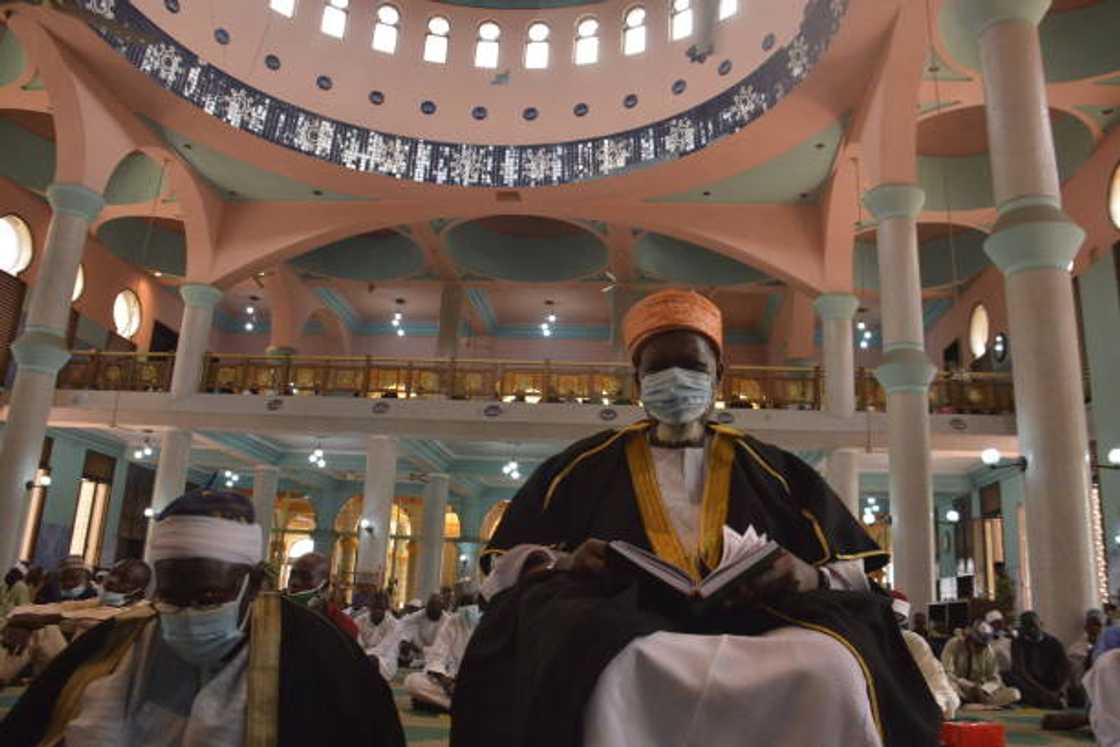
Source: Getty Images
Deeds that are permitted during fasting
Below are some deeds that are permitted during the fasting period.
Having a bath/taking a shower
One can shower, even if it is driven by overheating or thirst. Likewise, swimming is permitted only if the person fasting does not swallow the pool water.
Rinsing the nose and mouth
One may rinse their nose and mouth with water. This must not be done vigorously because excessive water could make one swallow some of it. If one consumes water when rinsing, the fast becomes invalid.
Injections
If the injections are for medical or nutritional reasons, they may be taken as advised by the experts.
Using eye drops or eyeliner
One may use kohl eyeliner or drops even if its taste can be felt down the throat.
Consuming food by accident
The accidental ingestion of food or involuntary consumption does not invalidate a fast.
Tasting food
Sawm is not cancelled if one tastes food with their tongue, as long as the food is not swallowed.
Using suppositories
It is okay to douche or have an enema done. Cleaning the behind via injection of a liquid for therapeutic reasons is allowed. Similarly, using a suppository or any other medicine in the private region is permitted.
Brushing teeth
One is allowed to brush their teeth using a toothbrush or mswaak. However, swallowing water or mouthwash invalidates fasting, so one must be cautious.
Kissing and other forms of displaying affection
Muslims can kiss or embrace their spouse if they can control themselves.
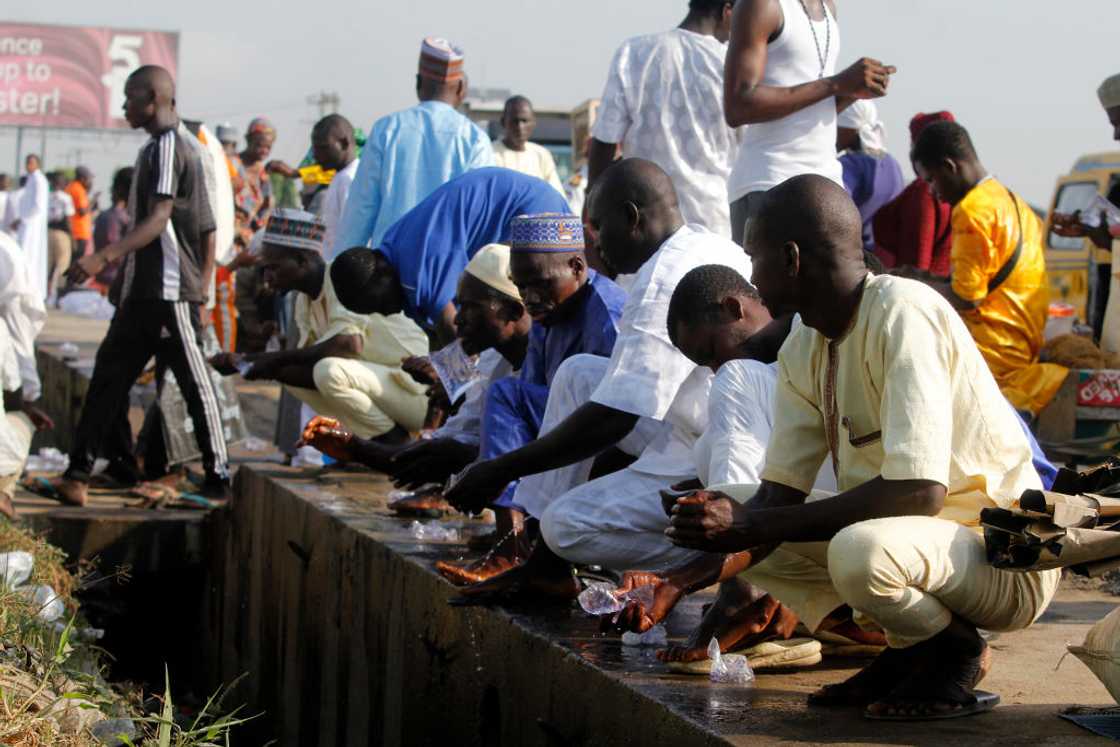
Source: Getty Images
The condition of janaabah after Fajr
Sawm is not invalidated by being in janaabah after dawn (Fajr). Janaabah refers to the ritual impurity following release.
If one finds oneself in this state after Fajr, one must take a full-body bath (ghusl) before continuing with the fast.
Perfumes and scents
One can use and breathe in fragrances and perfumes. Doing so does not invalidate fasting.
Acts that bring more rewards from Allah
Some actions during the month are said to bring added favour from Allah. Here is a look at the most prominent ones.
- Hurrying to break the fast at sunset
- Breaking the fast by eating an odd number of dry or fresh dates is the most common Ramadan food. Other healthy foods are recommended.
- Using mswaak to clean the teeth — this is a piece of root that is obtained from the Arkaak tree.
- Increasing the recitation of the Quran — studying the Quran more brings favour.
- Praying the Taraweeh after Isha
Actions that invalidate sawm
Every Muslim fasting should avoid things and activities that nullify their fast. When the fast is broken, 'qadaa' is required. This refers to making up for the days that one did not fast. Here is a look at the things that invalidate fasting
- When a woman starts her menstrual period or post-delivery bleeding, the fast becomes invalid, even if it is moments to sunset.
- Engaging in any sexual activity such as self-stimulation leading to release in men or secretions in women makes the sawm invalid. Sex while fasting is forbidden. Those who do so must make up for the days (qadaa) and practice kaffarah.
- The deliberate consumption of some food, smoking or drinking water or alcohol makes the fast invalid. If this is done, one must perform both qadaa and kaffarah.
Exemption from fasting
There are unique situations that may exempt Muslims from fasting. When these conditions occur, one is required to make up for the loss later. Those who cannot make up for the fast should feed one poor person for each day they are unable to fast. This is known as paying 'fidiya.' Exemptions from fasting are made if:
- One is travelling (they should make up for these days)
- One is temporarily ill (they should make up the days after they recover)
- One has a permanent illness (they should pay fidiya)
- A woman is experiencing post-delivery bleeding or menstruating (They should make up for the days once the bleeding stops)
- A woman is pregnant and weak (if sawm during pregnancy causes weakness, the woman can make up the days later or feed one poor person for each missed day)
Nigerian Ramadan food timetable
The food timetable is usually published as a general guide. One is free to adjust it to their favourite meals. Common meals to break the fasting include Mango Lassi, Efo riro, rice, moimoi bread, yams, fish, bread, and fruits.

Source: Getty Images
Ramadan 2025 fasting schedule
Muslims observe fasting from dawn (Fajr) until sunset (Maghrib) each day during Ramadan. Below is a Ramadan 2025 calendar;
Saturday, March 1, 2025:
- Suhoor (Pre-Dawn Meal): Ends at 5:45 AM
- Iftar (Breaking Fast): Begins at 6:58 PM
Sunday, March 2, 2025:
- Suhoor: Ends at 5:45 AM
- Iftar: Begins at 6:58 PM
Monday, March 3, 2025:
- Suhoor: Ends at 5:45 AM
- Iftar: Begins at 6:58 PM
Tuesday, March 4, 2025:
- Suhoor: Ends at 5:44 AM
- Iftar: Begins at 6:58 PM
Wednesday, March 5, 2025:
- Suhoor: Ends at 5:44 AM
- Iftar: Begins at 6:57 PM
Thursday, March 6, 2025:
- Suhoor: Ends at 5:44 AM
- Iftar: Begins at 6:57 PM
Friday, March 7, 2025:
- Suhoor: Ends at 5:43 AM
- Iftar: Begins at 6:57 PM
Prayer Times:
During Ramadan, Muslims also observe five daily prayers at specific times. These times are approximate and based on the schedule for Lagos during the first week of Ramadan, 2025.
- Fajr (Dawn Prayer): Immediately after Suhoor, around 5:45 AM
- Dhuhr (Midday Prayer): Around 1:03 PM
- Asr (Afternoon Prayer): Around 4:15 PM
- Maghrib (Sunset Prayer): Immediately after Iftar, around 6:58 PM
- Isha (Night Prayer): Around 8:04 PM
You can refer to the Islamic Finder website for a complete Ramadan calendar, including daily prayer times for different cities in Nigeria.
What are the expected dates for Eid in 2025?
In 2025, the Islamic calendar includes two major festivals: Eid al-Fitr and Eid al-Adha. The expected 2025 Ramadan Eid dates are as follows:
Eid al-Fitr 2025:
Expected Date: Sunday, March 30, 2025, or Monday, March 31, 2025
Eid al-Adha 2025:
Expected Date: Saturday, June 7, 2025
Ramadan 2025 timetable and Ramadan rules in Nigeria are observed with deep spiritual commitment and rich cultural traditions. The daily routine revolves around Suhoor, fasting, and Iftar, emphasising prayer, charity, and community bonding.
Legit.ng recently published an article on happy Ramadan wishes, quotes and greetings to send to your loved ones. According to the Islamic calendar, Ramadan is the holiest month. Usually, it is the ninth month of the religion's lunar calendar, and during this time, Muslims across the globe fast and pray.
The best way to show your unwavering support to them is through these amazing quotes and goodwill wishes.
Source: Legit.ng

Mercy Mbuthia (Lifestyle writer) Mercy Mbuthia is a content writer with five years of experience writing on various topics, including biographies, entertainment, and lifestyle. She joined the Legit team in 2019. Mercy earned a Master of Science (Food, Nutrition & Dietetics) from Dedan Kimathi University in 2022. Her articles have appeared on several media sites such as The Health Channel, The Nation, Tekrati, ValiantCEO and Celebrity Leader. In 2023, Mercy finished the AFP course on Digital Investigation Techniques. Email: mercymmbuthia18@gmail.com

Jackline Wangare (Lifestyle writer) Jackline Simwa is a content writer at Legit.ng, where she has worked since mid-2021. She tackles diverse topics, including finance, entertainment, sports, and lifestyle. Previously, she worked at The Campanile by Kenyatta University. She has more than five years in writing. Jackline graduated with a Bachelor’s degree in Economics (2019) and a Diploma in Marketing (2015) from Kenyatta University. In 2023, Jackline finished the AFP course on Digital Investigation Techniques and Google News Initiative course in 2024. Email: simwajackie2022@gmail.com.








